Scottish music hall and vaudeville theatre singer and comedian Harry Lauder (1870-1950) was perhaps best known for his long-standing hit I Love a Lassie and his other simplehearted Scottish songs. With his performances, he promoted the kilt and the cromach (walking stick) worldwide, especially in America. By 1911, Lauder had become the highest-paid performer in the world and was the first Scottish artist to sell a million records. He raised huge amounts of money for the war effort during World War I, for which he was subsequently knighted in 1919. He appeared in several films.
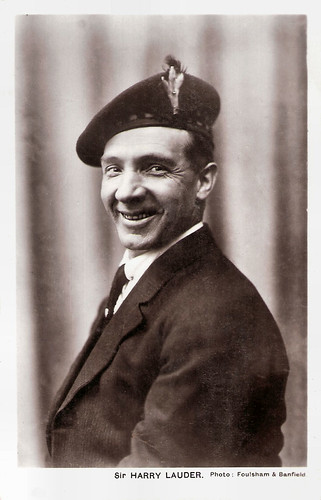
British postcard in the Picturegoer Series, London, no. T 2. Photo: Foulsham & Banfield.
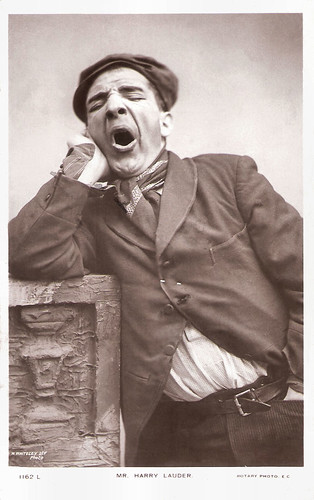
British postcard in the Rotary Photographic Series, no. 1162 L. Photo: W. Whiteley Ltd.
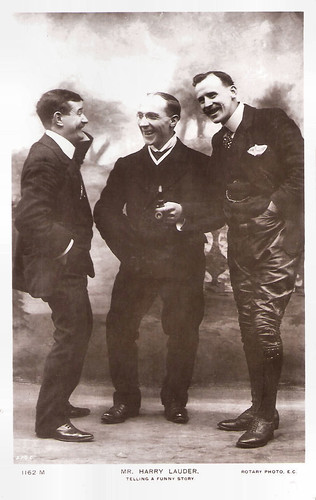
British postcard by Rotary Photo, no. 1162 M. Photo: S ph. C.
Sir Henry ‘Harry’ Lauder was born in 1870 in his maternal grandfather's house in Edinburgh. He was the eldest of seven children to John Lauder, a Master Potter, and his wife Isabella Urquhart Macleod née McLennan. Upon his father's death, Harry worked part-time at the local flax mill to fund his education and from 1884 on, he worked in the coal mine in Hamilton.
In 1891, at age 21, Lauder married Ann Vallance, daughter of a colliery manager in Hamilton. Lauder often sang to the miners in Hamilton, who encouraged him to perform in local music halls. He quit the coal mines and became a professional singer in 1894.
In 1900, Lauder travelled to London and was an immediate success at the Charing Cross Music Hall and the London Pavilion. In 1905, Lauder became a national star when he led the Howard & Wyndham pantomime at the Theatre Royal, Glasgow, for which he wrote I Love a Lassie. Lauder then made a switch from music hall to variety theatre and undertook a tour of America in 1907. The following year, he performed a private show before Edward VII at Sandringham, and in 1911, he again toured the United States, where he commanded $1,000 a night.
In 1912, he was top of the bill at Britain's first ever Royal Command Performance, in front of King George V. Harry wrote most of his own songs, favourites of which were Roamin' In The Gloamin', I Love a Lassie, A Wee Deoch-an-Doris, and The End of the Road, which is used by Birmingham City Football Club as their club anthem. Lauder undertook a world tour extensively during his forty-year career, including 22 trips to the United States — for which he had his own railroad train, the Harry Lauder Special- and made several trips to Australia, where his brother John had emigrated. Lauder was, at one time, the highest-paid performer in the world, making the equivalent of £12,700 a night plus expenses.
During the First World War (1914-1918), Lauder worked tirelessly to organise and recruit performers for shows given to troops serving abroad. Harry raised huge sums of money for war charities and entertained troops in the trenches in France, where he came under enemy fire. His entertainment activities were made poignant by the death in action of his only son, Captain John Lauder, at the end of 1916. Despite his son's death, he continued to publicly rally support for the war, ending each of his wartime shows with his theme tune, Keep Right on to the End of the Road. For his many services, he was knighted in 1919. After The Great War, Sir Harry Lauder continued to tour the now declining variety theatre circuits until his final tour in North America in 1932.
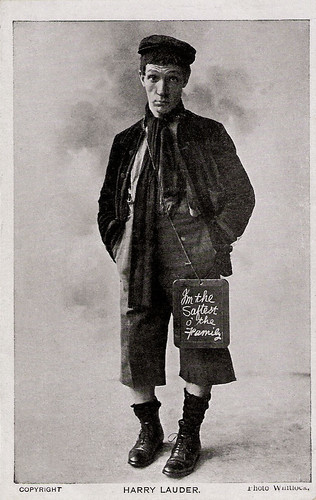
British postcard in the Star Series by G.D. & D., London. Photo: Whitlock.
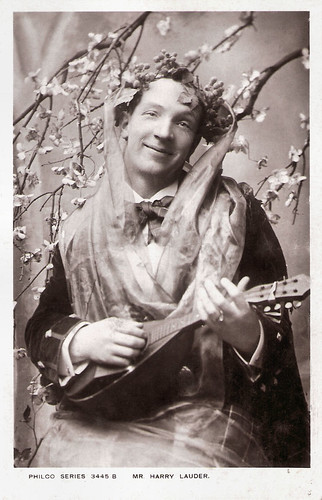
British postcard by the Philco Publishing Company, London, no. 3445 B. Sent by mail in Great Britain in 1909.
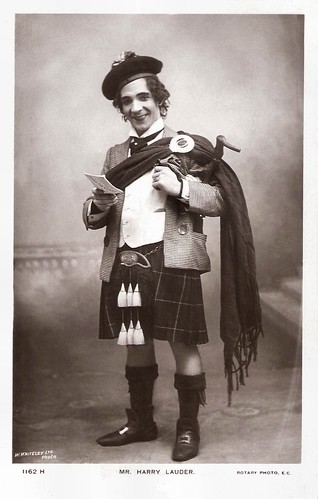
British postcard in the Rotary Photographic Series, no. 1162 H. Photo: W. Whiteley Ltd.
Harry Lauder appeared in several British films. In 1907, he appeared in a short film for British Gaumont, singing I Love a Lassie. In 1914, Lauder appeared in 14 Selig Polyscope experimental short sound films, including Harry Lauder Singing Roamin' in the Gloamin' (1914). He also appeared in a test film for the Photokinema sound-on-disc process in 1921. This film is part of the UCLA Film and Television Archive collection; however, the disc is missing.
Later, Lauder starred in three feature films: the silent Huntingtower (George Pearson, 1927) with Vera Voronina, the early musical Auld Lang Syne (George Pearson, 1929) and The End of the Road (Alex Bryce, 1936).
He was semi-retired in the mid-1930s until his final retirement was announced in 1935. However, he again entertained troops throughout Britain during World War II, despite his age, and made wireless broadcasts with the BBC Scottish Symphony Orchestra. He also appeared immediately after the war to thank the crews of American food relief ships docking at Glasgow.
Lauder wrote books, which ran into several editions, including 'Harry Lauder at Home and on Tour' (1912), 'A Minstrel in France' (1918), 'Between You and Me' (1919), 'Roamin' in the Gloamin'' (1928 autobiography), 'My Best Scotch Stories' (1929), 'Wee Drappies' (1931) and 'Ticklin' Talks' (circa 1932).
Harry Lauder leased the Glenbranter estate in Argyll to the Forestry Commission and spent his last years at Lauder Hall, his Strathaven home in Scotland, where he died in 1950, in his 80th year. His funeral was covered by Pathe News, and wreaths were received from all over the world, including one from Queen Elizabeth and another from Mr & Mrs Winston Churchill.
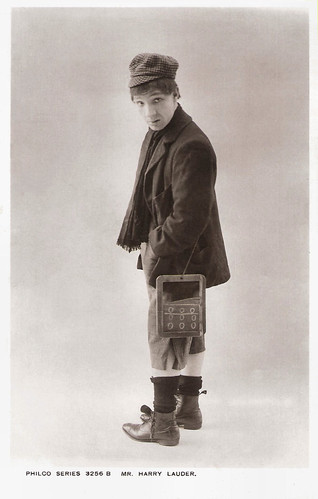
British postcard in the Philco Series, no. 3256 B.
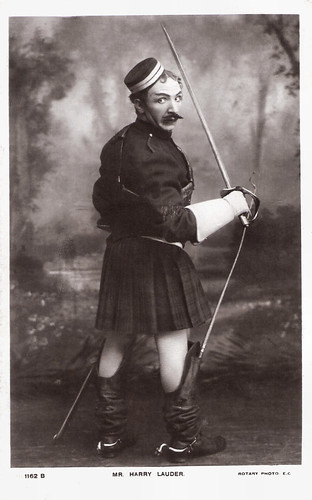
British postcard in the Rotary Photographic Series, no. 1162 B. Photo: Rotary.
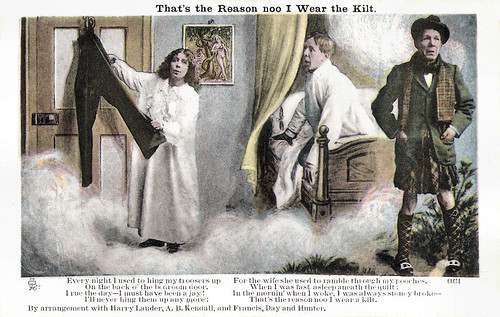
British postcard, no. 0034. By arrangement with Harry Lauder, A.B. Kendall, and Francis, Day and Hunter. Caption:
In this short film, Harry Lauder joins Charlie Chaplin for a couple of skits, including a mimicry of each other's well-known gait. This eight-minute short was part of an unfinished fund-raising project for injured soldiers during the war effort. Source: Dasinfogod (YouTube).
Sources: Gregory Lauder-Frost (Electric Scotland), Michael Duffy (First World War.com), Encyclopædia Britannica, Wikipedia and IMDb.
This post was last updated on 4 March 2025.

British postcard in the Picturegoer Series, London, no. T 2. Photo: Foulsham & Banfield.

British postcard in the Rotary Photographic Series, no. 1162 L. Photo: W. Whiteley Ltd.

British postcard by Rotary Photo, no. 1162 M. Photo: S ph. C.
The highest-paid performer in the world
Sir Henry ‘Harry’ Lauder was born in 1870 in his maternal grandfather's house in Edinburgh. He was the eldest of seven children to John Lauder, a Master Potter, and his wife Isabella Urquhart Macleod née McLennan. Upon his father's death, Harry worked part-time at the local flax mill to fund his education and from 1884 on, he worked in the coal mine in Hamilton.
In 1891, at age 21, Lauder married Ann Vallance, daughter of a colliery manager in Hamilton. Lauder often sang to the miners in Hamilton, who encouraged him to perform in local music halls. He quit the coal mines and became a professional singer in 1894.
In 1900, Lauder travelled to London and was an immediate success at the Charing Cross Music Hall and the London Pavilion. In 1905, Lauder became a national star when he led the Howard & Wyndham pantomime at the Theatre Royal, Glasgow, for which he wrote I Love a Lassie. Lauder then made a switch from music hall to variety theatre and undertook a tour of America in 1907. The following year, he performed a private show before Edward VII at Sandringham, and in 1911, he again toured the United States, where he commanded $1,000 a night.
In 1912, he was top of the bill at Britain's first ever Royal Command Performance, in front of King George V. Harry wrote most of his own songs, favourites of which were Roamin' In The Gloamin', I Love a Lassie, A Wee Deoch-an-Doris, and The End of the Road, which is used by Birmingham City Football Club as their club anthem. Lauder undertook a world tour extensively during his forty-year career, including 22 trips to the United States — for which he had his own railroad train, the Harry Lauder Special- and made several trips to Australia, where his brother John had emigrated. Lauder was, at one time, the highest-paid performer in the world, making the equivalent of £12,700 a night plus expenses.
During the First World War (1914-1918), Lauder worked tirelessly to organise and recruit performers for shows given to troops serving abroad. Harry raised huge sums of money for war charities and entertained troops in the trenches in France, where he came under enemy fire. His entertainment activities were made poignant by the death in action of his only son, Captain John Lauder, at the end of 1916. Despite his son's death, he continued to publicly rally support for the war, ending each of his wartime shows with his theme tune, Keep Right on to the End of the Road. For his many services, he was knighted in 1919. After The Great War, Sir Harry Lauder continued to tour the now declining variety theatre circuits until his final tour in North America in 1932.

British postcard in the Star Series by G.D. & D., London. Photo: Whitlock.

British postcard by the Philco Publishing Company, London, no. 3445 B. Sent by mail in Great Britain in 1909.

British postcard in the Rotary Photographic Series, no. 1162 H. Photo: W. Whiteley Ltd.
Roamin' in the Gloamin'
Harry Lauder appeared in several British films. In 1907, he appeared in a short film for British Gaumont, singing I Love a Lassie. In 1914, Lauder appeared in 14 Selig Polyscope experimental short sound films, including Harry Lauder Singing Roamin' in the Gloamin' (1914). He also appeared in a test film for the Photokinema sound-on-disc process in 1921. This film is part of the UCLA Film and Television Archive collection; however, the disc is missing.
Later, Lauder starred in three feature films: the silent Huntingtower (George Pearson, 1927) with Vera Voronina, the early musical Auld Lang Syne (George Pearson, 1929) and The End of the Road (Alex Bryce, 1936).
He was semi-retired in the mid-1930s until his final retirement was announced in 1935. However, he again entertained troops throughout Britain during World War II, despite his age, and made wireless broadcasts with the BBC Scottish Symphony Orchestra. He also appeared immediately after the war to thank the crews of American food relief ships docking at Glasgow.
Lauder wrote books, which ran into several editions, including 'Harry Lauder at Home and on Tour' (1912), 'A Minstrel in France' (1918), 'Between You and Me' (1919), 'Roamin' in the Gloamin'' (1928 autobiography), 'My Best Scotch Stories' (1929), 'Wee Drappies' (1931) and 'Ticklin' Talks' (circa 1932).
Harry Lauder leased the Glenbranter estate in Argyll to the Forestry Commission and spent his last years at Lauder Hall, his Strathaven home in Scotland, where he died in 1950, in his 80th year. His funeral was covered by Pathe News, and wreaths were received from all over the world, including one from Queen Elizabeth and another from Mr & Mrs Winston Churchill.

British postcard in the Philco Series, no. 3256 B.

British postcard in the Rotary Photographic Series, no. 1162 B. Photo: Rotary.

British postcard, no. 0034. By arrangement with Harry Lauder, A.B. Kendall, and Francis, Day and Hunter. Caption:
That's the Reason noo I Wear the Kilt.
Every night I used to hing my trousers up
On the back o' the bedroom door.
I rue the day - I must have been a jay!
I'll never hing them up any more;
For the wife she used to ramble through my pooches.
When I was fast asleep aneath the quilt;
In the mornin' when I woke, I was always stoney broke -
That's the reason noo I wear a kilt.
In this short film, Harry Lauder joins Charlie Chaplin for a couple of skits, including a mimicry of each other's well-known gait. This eight-minute short was part of an unfinished fund-raising project for injured soldiers during the war effort. Source: Dasinfogod (YouTube).
Sources: Gregory Lauder-Frost (Electric Scotland), Michael Duffy (First World War.com), Encyclopædia Britannica, Wikipedia and IMDb.
This post was last updated on 4 March 2025.
No comments:
Post a Comment